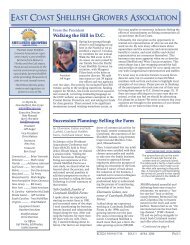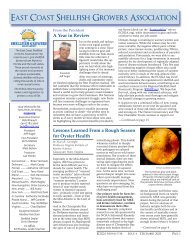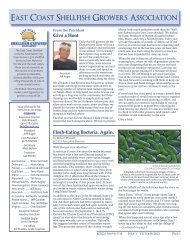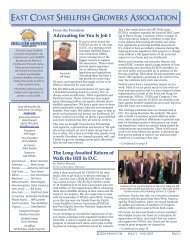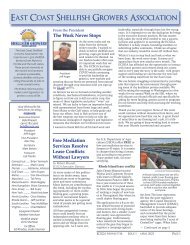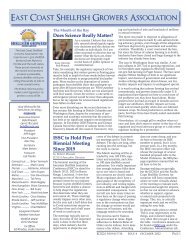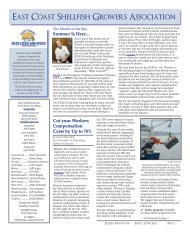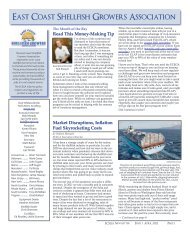ECSGA October 2022 Newsletter
This issue contains articles on social license for aquaculture, cultural benefits and social impacts of shellfish aquaculture, how best management practices differ from laws and regulations, mortality rates in floating gear vs. bottom gear, the story of how the Oceanfarmr (formerly known as SmartOysters) app came to be, and the difference between gross sales and net profit,
This issue contains articles on social license for aquaculture, cultural benefits and social impacts of shellfish aquaculture, how best management practices differ from laws and regulations, mortality rates in floating gear vs. bottom gear, the story of how the Oceanfarmr (formerly known as SmartOysters) app came to be, and the difference between gross sales and net profit,
Create successful ePaper yourself
Turn your PDF publications into a flip-book with our unique Google optimized e-Paper software.
More Thoughts on<br />
Social License<br />
by Robert Rheault,<br />
<strong>ECSGA</strong> Executive Director<br />
In April the World Wildlife Fund (WWF)<br />
held a workshop focused on the social license<br />
to farm kelp in New England. Around<br />
100 invitees from around the globe grappled<br />
with the question of how to get past some of<br />
the permitting obstacles impeding the expansion<br />
of kelp farming in coastal waters. I saw<br />
similarities between kelp-farm and shellfishfarm<br />
permitting challenges, so I was eager to<br />
hear the ideas the group came up with.<br />
As with shellfish farms, opposition to kelp<br />
farming can come from those who object to<br />
the visual impact of buoys and work boats,<br />
or from those concerned about navigational<br />
impacts and conflicts with commercial or<br />
recreational fishing. Since kelp is in the water<br />
only from <strong>October</strong> til May and the longlines<br />
run six feet below the surface, it’s hard<br />
to see how there is much of a navigation<br />
conflict, but if you have ever been to one of<br />
these lease hearings you’d think the applicants<br />
were proposing to pave the area under<br />
discussion. Although floating shellfish gear<br />
certainly has more of a potential impact on<br />
navigation than kelp gear, it can be hard to<br />
discern the difference between the two based<br />
on the vitriol often aired at these meetings.<br />
The full report from the workshop runs over<br />
50 pages with extensive sections on challenges<br />
and solutions, and communications and<br />
outreach. It notes that most of the solutions<br />
tend to involve elaborate communications<br />
efforts by lease proponents, often<br />
well in advance of submitting<br />
an application. Strategic messaging<br />
and outreach can help<br />
garner broader public support<br />
and reduce the recruitment of<br />
opponents who might be enlisted<br />
to spread misinformation.<br />
The WWF advice on messaging<br />
is clear: stay consistent, be<br />
open and transparent, focus<br />
on the science, and try to bring<br />
all the interested parties to the<br />
table. From my own experience,<br />
I would suggest that if you can<br />
talk to folks one-on-one or in<br />
small groups you are more likely<br />
to have fruitful conversations<br />
than in large groups (or, God<br />
help you, on Zoom). The mob<br />
mentality can quickly get ugly.<br />
When you are going into a public<br />
hearing it is important to bring a<br />
few outspoken proponents who<br />
can support you and challenge<br />
the prevailing negativism.<br />
Try to tailor your message to<br />
your audience and address false<br />
perceptions and fears about the<br />
unknowns. Talk about success<br />
NEW!<br />
stories where farms have found ways to fit<br />
in with their communities. Recognize and<br />
respect fear as a powerful emotion and try<br />
to work collaboratively on ways to address<br />
your opponents’ concerns. Dismissing or<br />
diminishing those concerns is not likely to<br />
be a fruitful strategy. This advice makes a lot<br />
of sense, but it does sound exhausting, and<br />
for a small firm just getting started it can be a<br />
significant challenge.<br />
At the workshop, Kim Thompson from the<br />
Aquarium of the Pacific (AOP) presented<br />
the results of bi-coastal surveys assessing the<br />
public perceptions of aquaculture. One of<br />
the key findings: the more a person knows<br />
about aquaculture, the more likely they<br />
are to be accepting of it. And in general, a<br />
person’s perceptions of aquaculture can be<br />
shaped by educating them about it. While<br />
these findings were broadly true in survey<br />
responses of the general population, it was<br />
not always consistent when you asked waterfront<br />
homeowners, fishermen or boaters.<br />
These folks tend to have a more negative<br />
view of aquaculture broadly, often because<br />
they perceive potential use conflicts, and<br />
their opinions are less likely to be swayed by<br />
education.<br />
The AOP surveys also showed that when it<br />
comes to winning hearts and minds, messages<br />
about aquaculture’s environmental<br />
benefits are more effective than extolling the<br />
jobs and economic benefits; and the most<br />
trusted messengers are scientists, aquariums<br />
and other farmers (not lease applicants).<br />
Another clear message to come out of the<br />
workshop was the damage that bad actors<br />
can do to the social license of the<br />
Iso 1800 <br />
REFRIGERATED<br />
MICROALGAE FOR<br />
SHELLFISH<br />
TP1800 <br />
Shellfish<br />
Diet<br />
1800 <br />
TW 1800 <br />
ReedMariculture.com/complete<br />
© <strong>2022</strong> Reed Mariculture, Inc. All rights reserved. Iso 1800, Shellfish Diet, Tp 1800, Tw 1800 & Ensuring Hatchery Success are trademarks or registered trademarks of Reed Mariculture Inc.<br />
community at large. If a farm gets established<br />
and the operators do things that<br />
damage the image of farming in the eyes of<br />
the community, the offending lease holders<br />
can make it impossible for another farm to<br />
become established.<br />
Building social license in the community involves<br />
recognizing that your “right to farm”<br />
is actually a privilege, not a right. Farms<br />
should be neat and orderly with uniform<br />
markings and well-maintained gear. No one<br />
wants a junk yard in their viewscape. Farm<br />
hands should be friendly, courteous and careful<br />
to follow regulations and norms. Escaped<br />
gear, loud noises and marine debris are going<br />
to alienate neighbors, and the entire farming<br />
community will pay for those transgressions.<br />
Most of this advice comes down to being a<br />
good neighbor, and much of it echoes what<br />
we have outlined in our <strong>ECSGA</strong> Best Management<br />
Practices manual. I hope you will<br />
do yourself (and the farming community at<br />
large) a favor and take a look.<br />
For more info on Best Management<br />
Practices visit ecsga.org/best-managementpractices.<br />
Pav 1800 <br />
<strong>ECSGA</strong> <strong>Newsletter</strong> Issue 3 <strong>October</strong> <strong>2022</strong> Page 13




